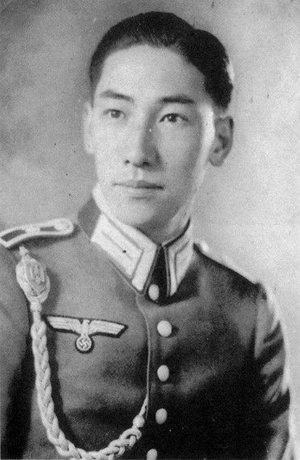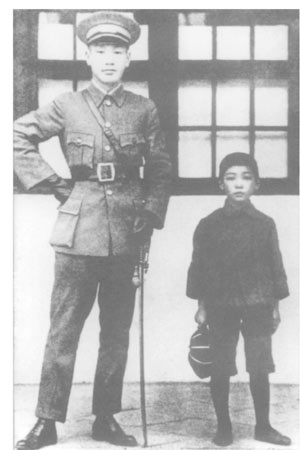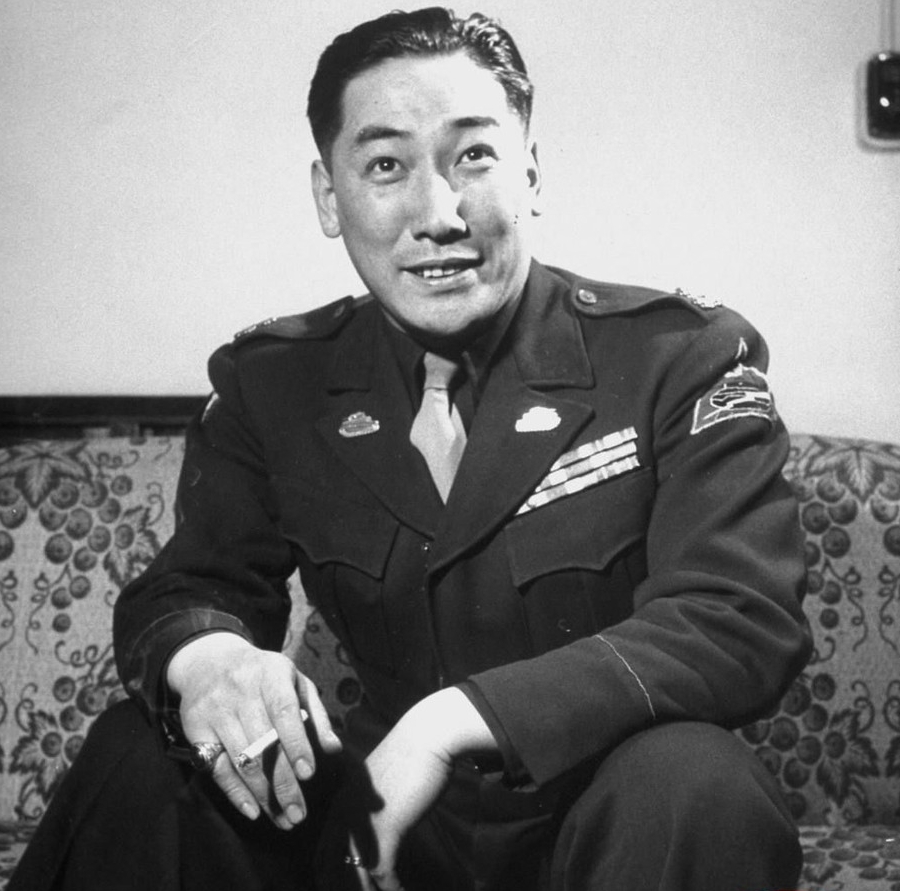The military histories of Germany and China before the Second World War were inextricably linked. One interesting testament to their close ties was when in March 1938, the German Wehrmacht crossed the border into Austria. This invasion was known as the Anschluss but is sometimes called the Blumenkrieg, or the war of flowers because it was unopposed. Among those Wehrmacht soldiers was a unique 21-year-old sergeant officer candidate.
Sources vary on which units he served with. Some state he commanded a Panzer regiment that crossed the border. Others indicate he served in the 98th Gebirgsjäger Regiment, the Wehrmacht’s specialized mountain troops.
All that is for sure is that this cadet stood apart from the rest of his men. He wasn’t German or even European. Chiang Wei-kuo was the son of Generalissimo Chiang Kai-shek, President of the Republic of China and head of the Kuomintang, the nationalist party of China.
Wei-kuo’s presence in Germany is curious for multiple reasons. Within two years, Germany would be allied to Japan, China’s adversary, during the Second-Sino Japanese War. How did Chiang Wei-kuo end up invading Austria the Wehrmacht?

Chiang Wei-kuo’s early life
When Chiang Wei-kuo was three years old, Chiang Kai-shek adopted him. His biological father was Tai Jitao, an old friend of Chiang Kai-shek. Tai had an affair with a Japanese woman, who gave birth to Wei-Kuo in Tokyo, Japan, in 1916. Tai, fearing his illegitimate child could end his career and marriage, requested Chiang Kai-shek to adopt Wei-kuo.
The plan was that Chiang Kai-shek could claim Wei-kuo was a child of Yao Yecheng, one of his concubines. For most of Wei-kuo’s life, he claimed he was Chiang Kai-shek’s biological son, though there were rumors throughout his life.
Wei-Kuo studied went to Dongwu University in eastern China, earning a physics degree. At the same time, he enrolled as a reserve officer in the Kuomintang army. While he attended school here, his brother, Chiang Ching-kuo, studied in Moscow.
After his father purged leftist elements from the Kuomintang in response to the rise of the Communist party, the USSR imprisoned Ching-kuo. For over a decade, Ching-kuo remained in Moscow.
During this time, the dutiful Chiang Kai-shek refused to negotiate a prisoner swap. He firmly believed that compromising China’s future was not worth his son’s life.

How Did Chiang Wei-Kuo Get to Germany?
In 1937, Ching-kuo returned home with a Belarusian wife. With both sons at home, Chiang Kai-shek decided to send Wei-kuo to receive a military education in Germany. The Second Sino-Japanese War was underway, and things weren’t going well in China.
Wei-kuo had great connections through his father. The German general, Alexander von Falkenhausen, served as Chiang Kai-shek’s military consultant at the start of the war. The Chief of German Army Command, Hans von Seeckt, also served as a Chinese military advisor for years.
Wei-Kuo enrolled in the Kriegsakademie in Munich. From the moment he arrived, events started falling in place that put him in Austria commanding German troops.
Since Germany enacted the Enabling Act in 1933, Hitler was the dictator of Germany. He had been planning to incorporate Austria into the German Reich and was about to make his move. In February of 1938, Hitler met the Austrian Chancellor Kurt Schuschnigg at his home near the Austrian border. There, he coerced Schnnigg into abdicating and appointing Arthur Seyss-Inquart as Chancellor of Austria.
Seyss-Inquart’s first move was to telegram the German government to request that the Wehrmacht invade Austria. By this time, Chiang Wei-kuo held the rank of Fahnenjunker, which meant he was a sergeant officer-candidate. He was selected to lead either a Panzer unit or part of a mountain unit.
After Anschluss, Germany began to integrate Austrian army units into the Wehrmacht immediately. As a result, We-Kuo became a Lieutenant of a Panzer unit made up of Austrian soldiers.
Leaving the German Army
After Anschluss, Hitler had his eyes on Czechoslovakian Sudetenland. He argued that a large German-speaking minority needed liberation. This event led to the famous Neville Chamberlain speech where he claimed that he brokered “peace for our times” after Hitler annexed the Sudetenland.
Wei-kuo did not participate in this or any other German military campaigns. According to his brother’s biographer, Jay Taylor, Wei-kuo wanted to. Shortly before Germany invaded Poland and kicked off World War Two, he graduated. A Panzer division on the Polish border was his next assignment. If not for a sudden reassignment, he would have likely been part of the invasion.
Chiang Wei-kuo received orders from his father to travel to the United States for further military training. Days before the war began, he sailed to the United States to enroll in the Army Air Corps School in Alabama.
Shortly after, his Panzer experience got him sent to the Armored Force Center in Fort Knox. A year later, he returned to China.
Home in China
When Chiang Wei-kuo returned home to China, things were in shambles. Japan occupied a large portion of the country and had unleashed unspeakable horrors like Nanjing Massacre.
He was given command of a Kuomintang garrison in Xi’an in central China and assisted his father, Chiang Kai-shek, in commanding Chinese efforts against the Japanese for the next five years.
After Japan’s defeat in 1945, the Kuomintang faced a civil war with Mao Zedong’s communist forces. Though it started in 1927, both sides put aside hostilities to meet Japan’s existential threat. From 1945 to 1949, they fought an all-out war.
Wei-kuo put his Panzer experience to use and commanded an M4 Sherman tank battalion. Despite many personal victories, the communists defeated the Kuomintang by 1949. Wei-kuo fled to Taiwan with his father and brother, along with the majority of remaining Kuomintang soldiers. Chiang Wei-Kuo’s Later Life
After arriving in Taiwan, Wei-kuo was appointed the head of an armor division outside of Taipei. He served an essential role in the military until 1964, when his subordinate General Chao Chih-hwa, launched a coup known as the Hukou Incident.

Despite a loss of prestige, he played a role in Taiwan’s military and politics until the 1990s. He was president of the Armed Forces University and held the rank of General.
He never forgot his time in the Wehrmacht. Even late in life, he had an affinity with the German military and even corresponded with Erich Stoelzner, a former German Kuomintang army advisor.
In 1986 retired from the military but maintained a position in public life. He served as an advisor to Taiwan’s president and the Secretary-general of the National Security Council before he passed away from Kidney failure in 1997. His last wish was to be buried in Suzhou on the Chinese mainland, but unfortunately, China and Taiwan’s politics prevented that.

